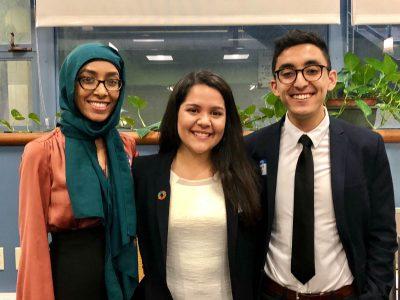
A team of students from Boston University have created an Android app to help educate displaced children.
RefEd is designed to deliver constant offline access to educational materials to the 6 million secondary school children affected by the refugee crisis. The idea for the app was born in a BU classroom, when co-founders Khadija Noor, Yasmin Morais and Albert Jimenez were tasked with finding a way to deliver quality education to refugee students.
The course, Forced Migration and Human Trafficking, taught by international relations professor Kaija Schilde, studied different areas of the refugee crisis, RefEd Executive Director Morais said.
“Our professor was always emphasizing that she didn’t want us only to be students, but to be entrepreneurs, to find dynamic solutions for real problems that the world was facing,” Morais, a College of Arts and Sciences senior, said. “The refugee crisis today is the largest since World War II.”
Schilde now acts as RefEd’s development advisor.
The team began research into the crisis and found a passion for education, Morais said. They were shocked by what they found — namely, that more than 3.5 million refugee children did not have access to regular education in the last academic year.
“… less than a quarter of refugees in secondary school have access to education,” Morais said.
Once downloaded, RefEd does not require an internet connection to work. The pilot version of the app already includes 150 math problems as well as media lessons. The goal is to make education fun, not an obligation, Morais said.
Noor is a former refugee from Somalia. Now a second-year graduate student in the Frederick S. Pardee School of Global Studies and the external relations director for RefEd, Noor wrote in an email that the app is meant to supplement work done on camps in youth centers. Morais referred to this as “closing the gap”.
“RedEd is an idea that was born from our need to help right a wrong in this world,” Noor wrote.
As external relations director, Noor connects the app team with Boston organizations as well as camps in Lebanon, Jordan and Kenya.
“We all understand that as students, we don’t have the expertise but as BU students, we have the resources to gain information from experts in the field.” Noor wrote.
One of the team’s main concerns is privacy, RefEd Communications Director Jimenez wrote in an email.
“It … needs to be able to protect the identity of students and their whereabouts,” Jimenez, a CAS senior, wrote. “Having limited knowledge between us … about cyber law and protection, we turned to the BU Law Clinic and recruited an excellent code developer.”
The team’s short-term goals include making the app accessible in a refugee camp by December and starting a two-month pilot program, Jimenez wrote. Afterward, they hope to provide education in multiple Arabic dialects and expand access across multiple camps by 2019.
While the RefEd developers initially did not have the all the knowledge necessary to achieve their goal, Noor wrote, BU mentors pointed them in the right direction. Now, they are seeking more people to join their team.
“We are actually looking for volunteers to help us with the app because there are so many components that need to be addressed to make the app work,” Noor wrote. “We believe that all someone needs is the enthusiasm to get involved to be able to create change.”
RefEd is hoping to bring volunteer interns, a social media manager and an expert in animation to the team. They hope to begin a fundraising committee soon, Morais said.
In his email, Jimenez stressed the importance of the project.
“RefEd is needed because education is needed,” he wrote. “Refugee children, in being forced into displacement, have everything taken from them. The existence and quality of their education, and in turn the depth of their ambitions and dreams are too heavily affected by factors out of their control. RefEd helps students retake control over their environment, education, and future.”
CORRECTION: A previous version of this article incorrectly identified the course taught by Schilde. An updated version of this article reflects this correction.



















































































































Eve • Sep 21, 2018 at 10:43 am
“RedEd is an idea that was born from our need to help right a wrong in this world,” Noor wrote.
^Small spelling check!